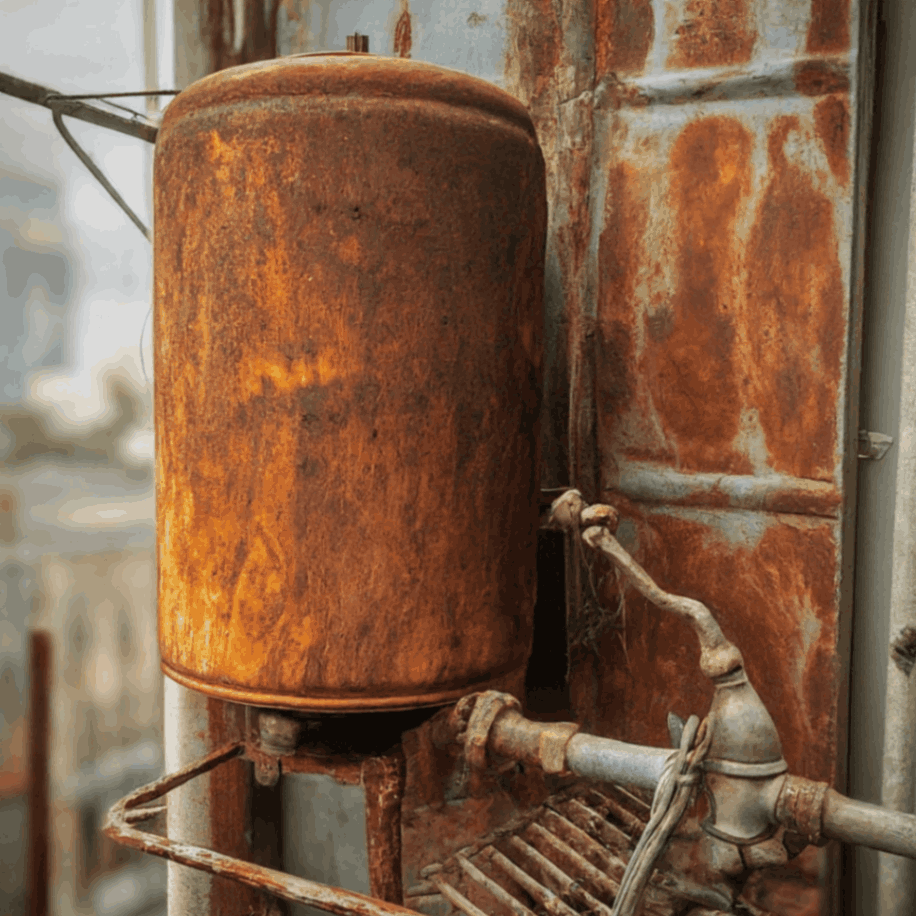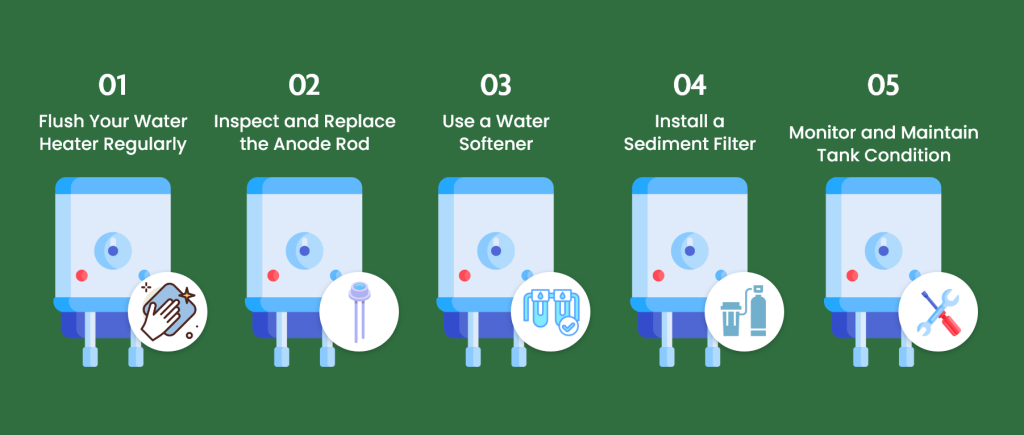 Last updated: August 23rd, 2024
Last updated: August 23rd, 2024
Water Heater Rust Problems? Here’s How to Prevent and Fix Them

Rust in water heaters is a common problem caused by the interaction of water and metal, leading to corrosion. It’s essential to address rust promptly to maintain the heater’s efficiency and lifespan. Neglecting rust can result in reduced performance, higher energy costs, and eventual damage requiring costly repairs or replacement. This guide outlines causes, troubleshooting steps, maintenance tips, and the benefits of home warranty coverage for rust-prone components.
Identifying Rust In Your Water Heater
Identifying rust in your water heater is crucial for maintaining its efficiency and preventing further damage. Here are key signs to look for:
- Discolored Water: Rusty or brown-colored water from hot water taps indicates rust inside the tank. This discoloration occurs as rust particles mix with the water supply, especially after inactivity.
- Metallic Taste or Odor: If your hot water tastes or smells metallic, it could be due to rust particles leaching into the water. This can affect the taste of water used for drinking, cooking, and bathing.
- Visible Rust: Inspect the exterior of the water heater for any signs of rust spots, especially around seams, fittings, or the bottom of the tank. Rust on the exterior often indicates that internal components may also be affected.
- Leaks: Rust can weaken the tank’s structure, leading to potential leaks. Check for any puddles or damp areas around the water heater, which may indicate a compromised tank or fittings.
- Noises: Rust flakes breaking off inside the tank can cause popping or cracking noises during operation. These sounds may indicate significant rust buildup or corrosion within the tank.
- Reduced Hot Water Supply: Rust and sediment buildup can reduce the efficiency of the water heater, resulting in less hot water for daily use. Rust accumulation may contribute if you notice a decrease in hot water supply or inconsistent water temperatures.
- Age of the Water Heater: Consider the age of your water heater. Older units are more prone to rusting and corrosion, especially if regular maintenance and inspections have been neglected.
Addressing these signs of rust can help prevent further deterioration of your water heater and avoid more costly repairs or replacements. If you suspect significant rust or damage, it’s advisable to consult a professional plumber or water heater technician for a thorough inspection and appropriate repairs.
What Causes Rust In Water Heaters?
Rust in water heaters primarily occurs due to the chemical process known as oxidation, where metal interacts with oxygen and water molecules, leading to corrosion. This process starts when the metal surface of the water heater tank or components reacts with oxygen in the presence of moisture. Over time, this reaction forms iron oxide, commonly known as rust, which weakens the metal and can lead to leaks or other issues.
Common Causes of Rust in Water Heaters
- Anode Rod Corrosion: The sacrificial anode rod inside the water heater tank is designed to attract corrosive elements away from the tank walls. Over time, this rod can corrode ultimately, leading to rust formation on the tank walls.
- High Iron Content in Water: Water with elevated iron levels can accelerate rust formation inside the tank, especially if not treated or filtered correctly.
- Sediment Buildup: Mineral sediments accumulate at the bottom of the tank over time. These sediments trap water against the tank’s metal surface, promoting corrosion and rusting.
- Moisture and Oxygen Exposure: External factors such as humidity or leaks can introduce moisture and oxygen to the tank’s interior, facilitating rusting.
- Damaged Tank Lining: Any damage to the tank’s protective lining can expose the underlying metal to water, accelerating rust formation.
Understanding these causes helps implement effective prevention and maintenance strategies to mitigate rusting in water heaters.
Top 5 Tried & Tested Tips To Get Rid Of Rust
Dealing with rust can be challenging, but these proven methods can help effectively eliminate and prevent it:

Flush Your Water Heater Regularly
- Remove Sediment: Flush your water heater at least once a year to remove sediment and rust-causing particles.
- Improve Water Quality: Regular flushing ensures cleaner water by eliminating accumulated debris.
- Enhance Efficiency: Removing sediment helps the heater operate more efficiently, reducing energy consumption.
- Extend Lifespan: Preventative maintenance can significantly extend the life of your water heater.
Inspect and Replace the Anode Rod
- Annual Inspection: Check the anode rod annually to ensure it’s not excessively corroded.
- Replace Every 3-5 Years: The manufacturer recommends changing the rod every 3-5 years or as often as necessary.
- Prevent Rust Buildup: The anode rod attracts corrosive elements, protecting the tank lining from rust.
- Maintain Performance: A healthy anode rod helps maintain optimal water heater performance.
Use a Water Softener
- Install a Softener: Add a water softener to reduce the mineral content in your water supply.
- Prevent Scale Buildup: Softened water minimizes the formation of scale and mineral deposits inside the tank.
- Reduce Rust Formation: Lower mineral content helps prevent the conditions that lead to rust.
- Prolong Heater Lifespan: Using softened water can extend the lifespan of your water heater.
Install a Sediment Filter
- Add a Filter: Place a sediment filter on your water heater’s inlet to trap debris and sediment.
- Prevent Rust Particles: The filter catches rust-causing particles before they enter the tank.
- Improve Water Quality: Filtering sediment enhances the overall quality of your water.
- Reduce Maintenance: A sediment filter decreases the need for frequent tank flushing.
Monitor and Maintain Tank Condition
- Regular Inspections: Check your water heater for any signs of rust or leaks.
- Promptly Address Issues: Clean and apply rust-resistant paint to any minor rust spots immediately.
- Prevent Rust Spread: Early intervention helps stop rust from spreading and causing severe damage.
- Ensure Longevity: Consistent monitoring and maintenance extend the life of your water heater.
By following these tried and tested tips, you can effectively manage and reduce rust in your water heater, ensuring reliable performance and longevity. Consistent maintenance and proactive measures are vital to protecting your investment and avoiding costly repairs or replacements.
Understanding Home Warranty Coverage And Water Heater
A home warranty is a service contract that repairs or replaces significant home systems and appliances when they break down due to normal wear and tear. Water heaters are commonly covered items under these warranties. Here’s a detailed look at what you need to know about home warranty coverage for water heaters, including what’s typically covered, exclusions, and top home warranty companies.
Coverage
Home warranties generally cover the following essential components and parts of a water heater:
- Burner assembly: Includes the burner, pilot, and associated parts responsible for heating the water.
- Control thermostat and thermocouple: Regulates the temperature and ensures the safe operation of the heater.
- Gas valve: Controls gas flow to the burner, essential for ignition and heating.
- Heating elements: Electric elements responsible for heating the water in electric water heaters.
- Temperature control: Manages the water temperature to ensure it stays within safe limits.
- Thermal expansion tank: Absorbs excess pressure to prevent water heater and plumbing damage.
- T&P relief valve: Temperature and pressure relief valve that prevents the tank from exploding by releasing excess pressure.
Exclusions To Consider
Home warranties typically do not cover the following:
- Pre-existing conditions: Issues that existed before the warranty was purchased.
- Improper installation: Damage resulting from incorrect installation methods.
- Lack of maintenance: Problems arising from neglecting proper maintenance routines.
- Cosmetic damage: Issues that do not affect the water heater’s functionality.
Top Home Warranty Companies Covering Water Heater
When selecting a home warranty provider, it’s essential to choose a company known for comprehensive coverage of water heaters. Here are some top home warranty companies that offer robust plans for water heaters:
$100 OFF and Free Roof Coverage
Premium
$54.99 - $89.99
Deductible
$75.00 - $125.00
Coverage Limit
$4K - $5K
Why We Picked It
Offers comprehensive plans with flexible options, including rust and corrosion coverage.
$50 off + 1 Month Free
Premium
$46 - $55
Deductible
$75 - $125
Coverage Limit
Upto $3K/item
Why We Picked It
Provides standard and comprehensive plans with optional add-ons for enhanced protection.
$150 OFF and 2 Months Free + Free Roof Coverage
Premium
$54.99 - $64.99
Deductible
$60.00 - $125.00
Coverage Limit
$3K/Item
Why We Picked It
Includes water heaters in standard coverage with additional options for rust and corrosion.
Conclusion
Preventing and eliminating rust in your water heater is essential for its efficiency and longevity. Regular maintenance, prompt attention to signs of rust, and understanding your home warranty coverage can help protect your investment and avoid costly repairs or replacements. By following these tips and choosing a reliable home warranty provider, you can ensure your water heater's continued performance and durability.
related articles
 Discover First American Home Warranty Locations and What You Need to Know About Their Cover.
Discover First American Home Warranty Locations and What You Need to Know About Their Cover.
 Reviews of Home Warranty Companies Show You How to Determine If Your Home Is Covered
Reviews of Home Warranty Companies Show You How to Determine If Your Home Is Covered













